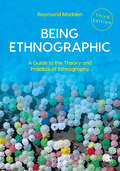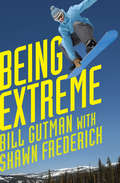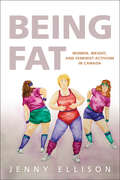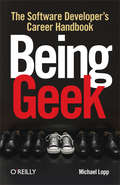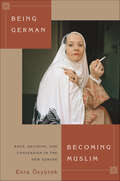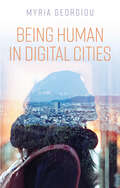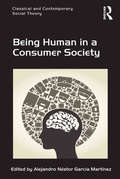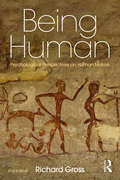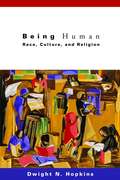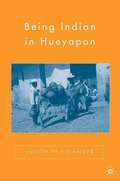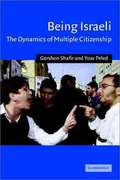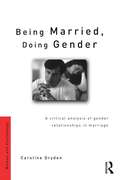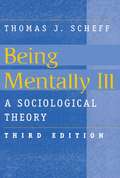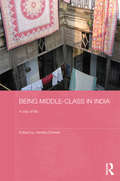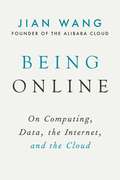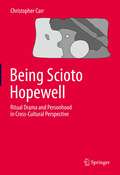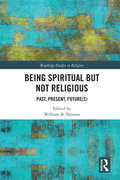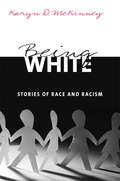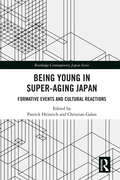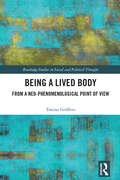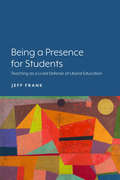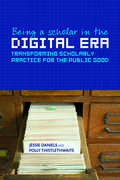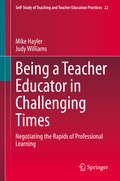- Table View
- List View
Being Ethnographic: A Guide to the Theory and Practice of Ethnography
by Raymond MaddenBeing Ethnographic is a fundamental introductory guidebook to process and utilization of doing fieldwork within real-world settings. It explores our understanding of identities, the future of ethnography and the advancing role of technology in a global, networked society. The third edition of Being Ethnographic highlights the challenges introduced by the ethnographers′ own interests, biases and ideologies and demonstrates the importance of methodological reflexivity. This fully updated third edition includes: Discussions on technology and multimodality as hands-on tools for the field Helpful insights into making thoughtful choices around a research design Aid in engaging ethically and effectively within the field Lasting tips for finalising and conducting research Raymond Madden provides invaluable guidance for applying fundamental ethnographic principles within the field and gives students and researchers everything they need to walk a mile in someone else′s shoes.
Being Ethnographic: A Guide to the Theory and Practice of Ethnography
by Raymond MaddenBeing Ethnographic is a fundamental introductory guidebook to process and utilization of doing fieldwork within real-world settings. It explores our understanding of identities, the future of ethnography and the advancing role of technology in a global, networked society. The third edition of Being Ethnographic highlights the challenges introduced by the ethnographers′ own interests, biases and ideologies and demonstrates the importance of methodological reflexivity. This fully updated third edition includes: Discussions on technology and multimodality as hands-on tools for the field Helpful insights into making thoughtful choices around a research design Aid in engaging ethically and effectively within the field Lasting tips for finalising and conducting research Raymond Madden provides invaluable guidance for applying fundamental ethnographic principles within the field and gives students and researchers everything they need to walk a mile in someone else′s shoes.
Being Extreme: Thrills and Dangers in the World of High-Risk Sports
by Bill GutmanAs fast-paced as a freefall from a roaring airplane, as thrilling as a towering jump off a ski slope, Being Extreme is a fascinating examination of the adrenaline rush of extreme sports. Here is a world where living life on the edge is the only option, where you are only as good as your last jump . . . and where one false move can take you out of the game permanently.From mountain climbing and freestyle motocross to skydiving and snowboarding and beyond, in the past decade, the world of extreme sports has exploded onto the scene, with daredevils attempting acts of athleticism that leave spectators awed . . . and fearful. Being Extreme explores the motivations and societal impulses behind these high-risk lifestyles through interviews with professional athletes and recreational enthusiasts, as well as with psychiatrists who seek to understand the motivation behind these &“Big T&” personalities. Authors Gutman and Frederick also explore what heart-stopping sports are around the next curve, because in a world where the &“rush&” is everything, everyone is always upping their game.
Being Fat: Women, Weight, and Feminist Activism in Canada
by Jenny EllisonIt is okay to be fat. This is the basic premise of fat activism, a social movement that has existed in Canada since the early 1970s. This book focuses on the earliest strands of the Canadian movement, which emerged around 1977 and ended around 1997 with the emergence of defiant performance artists Pretty, Porky, and Pissed Off. This twenty-year window loosely correlates with the rise of "second-wave" feminist organizing and thinking in the country. Fat activists were wrestling with issues other feminists of the era were debating: femininity, sexuality, and health. While united by the idea that it is okay to be fat, the movement has taken many different forms. Fat "activism" and the "movement" encompassed a variety of activities. It included groups that held regular meetings and published newsletters, organized events, and elected an executive. Being Fat explores activities like fashion design, self-help groups, plus-size modelling, and dance under the umbrella of fat activism, undertaken in the name of empowering fat women. Together, these activities show that self-identified fat women took up feminist ideas of liberation and applied them to their lives. Their personal experiences became the basis of a powerful movement to challenge beauty and bodily norms.
Being Geek: The Software Developer's Career Handbook
by Michael LoppAs a software engineer, you recognize at some point that there's much more to your career than dealing with code. Is it time to become a manager? Tell your boss he’s a jerk? Join that startup? Author Michael Lopp recalls his own make-or-break moments with Silicon Valley giants such as Apple, Netscape, and Symantec in Being Geek -- an insightful and entertaining book that will help you make better career decisions.With more than 40 standalone stories, Lopp walks through a complete job life cycle, starting with the job interview and ending with the realization that it might be time to find another gig. Many books teach you how to interview for a job or how to manage a project successfully, but only this book helps you handle the baffling circumstances you may encounter throughout your career.Decide what you're worth with the chapter on "The Business"Determine the nature of the miracle your CEO wants with "The Impossible"Give effective presentations with "How Not to Throw Up"Handle liars and people with devious agendas with "Managing Werewolves"Realize when you should be looking for a new gig with "The Itch"
Being German, Becoming Muslim: Race, Religion, and Conversion in the New Europe (Princeton Studies in Muslim Politics #56)
by Esra ÖzyürekEvery year more and more Europeans, including Germans, are embracing Islam. It is estimated that there are now up to one hundred thousand German converts—a number similar to that in France and the United Kingdom. What stands out about recent conversions is that they take place at a time when Islam is increasingly seen as contrary to European values. Being German, Becoming Muslim explores how Germans come to Islam within this antagonistic climate, how they manage to balance their love for Islam with their society's fear of it, how they relate to immigrant Muslims, and how they shape debates about race, religion, and belonging in today’s Europe.Esra Özyürek looks at how mainstream society marginalizes converts and questions their national loyalties. In turn, converts try to disassociate themselves from migrants of Muslim-majority countries and promote a denationalized Islam untainted by Turkish or Arab traditions. Some German Muslims believe that once cleansed of these accretions, the Islam that surfaces fits in well with German values and lifestyle. Others even argue that being a German Muslim is wholly compatible with the older values of the German Enlightenment.Being German, Becoming Muslim provides a fresh window into the connections and tensions stemming from a growing religious phenomenon in Germany and beyond.
Being Human in Digital Cities
by Myria GeorgiouHow is life in digital cities changing what it means to be human?In this perceptive book, Myria Georgiou sets out to investigate the new configuration of social order that is taking shape in today’s cities. Although routed through extractive datafication, compulsive connectivity, and regulatory AI technologies, this digital order nonetheless displaces technocentrism and instead promotes new visions of humanism, all in the name of freedom, diversity, and sustainability. But the digital order emerges in the midst of neoliberal instability and crises, resulting in a plurality of contrasting responses to securing digitally mediated human progress. While corporate, media, and state actors mobilize such positive sociotechnical imaginaries to promise digitally mediated human progress, urban citizens and social movements propose alternative pathways to autonomy and dignity through and sometimes against digital technologies. Investigating the dynamic workings of technology and power from a transnational and comparative perspective, this book reveals the contradictory claims and struggles for the future of digital cities and their humanity. In doing so, it will enrich understandings of digital urbanism, critical data studies, and critical humanist studies.
Being Human in a Consumer Society (Classical and Contemporary Social Theory)
by Alejandro Néstor MartínezThis book offers a new perspective on sociological studies of the consumer society, introducing neglected normative questions relating to the good life and human flourishing - subjects more commonly discussed in fields of moral, political, and social philosophy. With attention to a wide range of subjects, including postemotional law and responsibility, dehumanised consumption and prosumerism, fashion, embodiment, conspicuous consumption, and sustainability, this book analyzes the structural and cultural transformations that can be identified in consumer society. It also offers a critical - but not pessimistic - view of the important question of whether consumption is leading to an increasing isolation, individualization or commodification of human beings, suggesting an analytical framework for understanding consumer culture and human praxis. Bringing together work from across disciplines by scholars in the US, Europe, and the UK to engage with questions concerning our globalized and globalizing world, where consumerism is a keystone for understanding our contemporary culture and its social structures, Being Human in a Consumer Society will appeal to scholars and students of sociology, social theory, and contemporary philosophy.
Being Human: Psychological Perspectives on Human Nature
by Richard GrossWhile there may be no one single characteristic that differentiates humans as a species, it is the combination of differences from other species that makes us unique. The new edition of Being Human examines the psychology of being human through exploring different psychological traditions alongside philosophy and evolutionary theory, covering themes such as culture, cognition, language, morality, and society. Our nature – or ‘essence’ – is something that has preoccupied human beings throughout our history, beginning with philosophy and religion, and continuing through the biological, social, and psychological sciences. Being Human begins by describing some of the major philosophical accounts of human nature, from Ancient Greek philosophers, such as Plato and Aristotle, to major British and Continental philosophers, such as Locke and Nietzsche. The book considers religious accounts of human nature, with their focus on the nature of good and evil, and scientific accounts of genetics and the brain, which underpin the distinctively human cognitive ability of language. Attention then turns to the ideas of the behaviourists, such as Skinner, Freud, and other psychodynamic psychologists, and humanistic-phenomenological psychologists, such as Maslow. Finally, human culture is discussed as the ultimate defining characteristic of human beings: culture represents our ‘natural habitat’ and what defines us as a species. This updated second edition includes increased coverage of social psychology and has a broader scope, in order to identify the defining characteristics of human beings. With reference to current psychological research and philosophical material, this is fascinating reading for students of psychology, philosophy, and the social sciences.
Being Human: Race, Culture, and Religion
by Dwight N. HopkinsThe author’s important work in Black Theology has mediated class theological concerns through the prism of African American culture, here offers a fresh take on theological anthropology. Rather than defined "the human" as one eternal or inviolable essence, however, Hopkins looks to the multiple and conflicting notions of the human in contemporary thought, and particularly three key variables: culture, self, and race. Hopkins' critical reframing of these concepts firmly locates human endeavor, development, transcendence, and liberation in the particular messiness of struggle and strife.
Being Indian In Hueyapan
by Judith FriedlanderIn this revised and updated edition, Judith Friedlander places her widely acclaimed work in historical context. The book describes the lives of the inhabitants of an indigenous pueblo during the late 1960s and early 1970s and analyzes the ways that Indians like them have been discriminated against since early colonial times.
Being Israeli: The Dynamics of Multiple Citizenship
by Gershon Shafir Yoav PeledThis penetrating and timely study by two well-known scholars offers a theoretically informed account of the political sociology of Israel. The argument is set in its historical context as the authors trace Israel's development from the beginning of Zionist settlement in Palestine in the early 1880s to the Oslo accords in 1993, and finally to the recent Palestinian uprising. Against this background, they speculate on the idea of citizenship and what it means to be the citizen of a fragmented and ideologically divided society.
Being Married, Doing Gender: A Critical Analysis of Gender Relationships in Marriage (Women and Psychology)
by Caroline DrydenIn one of the first psychological studies of women in heterosexual relationships, Caroline Dryden examines the social context of their experiences and emotional struggles. Unlike the developmental literature in which women are studied only as mothers, or the clinical literature which has little theoretical basis, Being Married, Doing Gender places case study material in the context of the power balance between women and men. Caroline Dryden finds that there are contradictions between stereotypical gender roles and the maintenance of an equal partnership that can cause problems for both women and men. Being Married, Doing Gender will be valuable to students studying psychology or gender and women's studies and to marriage guidance counsellors and psychotherapists.
Being Mentally Ill: A Sociological Study
by Thomas J. ScheffIn incorporating social process into a model of the dynamics of mental disorders, this text questions the individualistic model favoured in current psychiatric and psychoanalytic theory. While the conventional psychiatric viewpoint seeks the causes of mental illness, Scheff views "the symptoms of mental illness" as the violation of residual rules - social norms so taken for granted that they are not explicitly verbalized. The sociological theory developed by Scheff to account for such behaviour provides a framework for studies reported in subsequent chapters. Two key assumptions emerge: first, that most chronic mental illness is in part a social role; and second, that societal reaction may in part determine entry into that role. Throughout, the sociological model of mental illness is compared and contrasted with more conventional medical and psychological models in an attempt to delineate significant problems for further analysis and research. This third edition has been revised and expanded to encompass the controversy prompted by the first edition, and also to re-evaluate developments in the field. New to this edition are discussions of the use of psychoactive drugs in the treatment of mental illness, changing mental health laws, new social science and psychiatric studies, and the controversy surrounding the labelling theory of mental illness itself.
Being Middle-class in India: A Way of Life (Routledge Contemporary South Asia Series)
by Henrike DonnerHailed as the beneficiary, driving force and result of globalisation, India’s middle-class is puzzling in its diversity, as a multitude of traditions, social formations and political constellations manifest contribute to this project. This book looks at Indian middle-class lifestyles through a number of case studies, ranging from a historical account detailing the making of a savvy middle-class consumer in the late colonial period, to saving clubs among women in Delhi’s upmarket colonies and the dilemmas of entrepreneurial families in Tamil Nadu’s industrial towns. The book pays tribute to the diversity of regional, caste, rural and urban origins that shape middle- class lifestyles in contemporary India and highlights common themes, such as the quest for upward mobility, common consumption practices, the importance of family values, gender relations and educational trajectories. It unpacks the notion that the Indian middle-class can be understood in terms of public performances, surveys and economic markers, and emphasises how the study of middle-class culture needs to be based on detailed studies, as everyday practices and private lives create the distinctive sub-cultures and cultural politics that characterise the Indian middle class today. With its focus on private domains middleclassness appears as a carefully orchestrated and complex way of life and presents a fascinating way to understand South Asian cultures and communities through the prism of social class.
Being Muslim and Working for Peace
by Raphael SusewindBeing Muslim and Working for Peace explores various ways in which religious beliefs, ritual practices and dynamics of belonging impact the politics of Muslim peace activists in Gujarat, and traces how their activism in turn transforms their sense of being. It challenges popular notions about Muslims in India and questions ill-conceived research designs in the sociology of religion. More than a decade after the 2002 riots in Gujarat, this empirical typology sheds light on the diversity of Muslim civil society and Muslims in civil society. Muslim peace activists in post-conflict Gujarat experience the 'ambivalence of the sacred' as a personal dynamic; as faith-based actors, secular technocrats, emancipating women and doubting professionals, they struggle for a better future in diverse and sometimes surprising ways. By taking their diversity seriously, this book sharpens the distinction between ambivalence and ambiguity, and provides fresh perspectives on religion and politics in India today.
Being Online: On Computing, Data, the Internet, and the Cloud
by Jian WangA pioneer of cloud computing and big data offers his vision of the future world taking shape around us. Jian Wang was the founder and architect of Alibaba's cloud and has been the driving force behind its technology innovations. He was also the founder of the City Brain initiative to develop a new digital infrastructure for sustainable cities. Being Online is his meditation on the moment we are in, as the digital era shifts to the internet era, spawning new innovations at a seemingly dizzying pace: cloud computing, 5G, artificial intelligence, big data, wearables, robots, virtual reality, the internet of things, blockchain, and more. For Wang, the invisible hand that connects them is being online. The conjunction of computing, data, and the internet has erased the difference between being online and off. When computing can be done in the cloud, it is on the road to becoming a utility. When data is connected, making it big, its usefulness multiplies exponentially in unforeseeable ways, as does its value. This moment will be as transformative for humanity as Henry Ford's production line. Data is changing the nature of business. Computing is reshaping the economy. The cloud will help us do things we could never do before, at scales that were previously impossible. It will reshape our vision of the world, as electrification once did and, more recently, the transition from analog to digital. While telling the story of Alibaba&’s breakthroughs and the development of his own understanding of the internet, Jian Wang's visionary book lays out the implications of this shift and how to think about being online.
Being Scioto Hopewell: Ritual Drama and Personhood in Cross-Cultural Perspective
by Christopher CarrThis book, in two volumes, breathes fresh air empirically, methodologically, and theoretically into understanding the rich ceremonial lives, the philosophical-religious knowledge, and the impressive material feats and labor organization that distinguish Hopewell Indians of central Ohio and neighboring regions during the first centuries CE. The first volume defines cross-culturally, for the first time, the “ritual drama” as a genre of social performance. It reconstructs and compares parts of 14 such dramas that Hopewellian and other Woodland-period peoples performed in their ceremonial centers to help the soul-like essences of their deceased make the journey to an afterlife. The second volume builds and critiques ten formal cross-cultural models of “personhood” and the “self” and infers the nature of Scioto Hopewell people’s ontology. Two facets of their ontology are found to have been instrumental in their creating the intercommunity alliances and cooperation and gathering the labor required to construct their huge, multicommunity ceremonial centers: a relational, collective concept of the self defined by the ethical quality of the relationships one has with other beings, and a concept of multiple soul-like essences that compose a human being and can be harnessed strategically to create familial-like ethical bonds of cooperation among individuals and communities. The archaeological reconstructions of Hopewellian ritual dramas and concepts of personhood and the self, and of Hopewell people’s strategic uses of these, are informed by three large surveys of historic Woodland and Plains Indians’ narratives, ideas, and rites about journeys to afterlives, the creatures who inhabit the cosmos, and the nature and functions of soul-like essences, coupled with rich contextual archaeological and bioarchaeological-taphonomic analyses. The bioarchaeological-taphonomic method of l’anthropologie de terrain, new to North American archaeology, is introduced and applied. In all, the research in this book vitalizes a vision of an anthropology committed to native logic and motivation and skeptical of the imposition of Western world views and categories onto native peoples.
Being Spiritual but Not Religious: Past, Present, Future(s) (Routledge Studies in Religion)
by William B. ParsonsIn its most general sense, the term "Spiritual but Not Religious" denotes those who, on the one hand, are disillusioned with traditional institutional religion and, on the other hand, feel that those same traditions contain deep wisdom about the human condition. This edited collection speaks to what national surveys agree is a growing social phenomenon referred to as the "Spiritual but Not Religious Movement" (SBNRM). <P><P> Each essay of the volume engages the past, present and future(s) of the SBNRM. Their collective contribution is analytic, descriptive, and prescriptive, taking stock of not only the various analyses of the SBNRM to date but also the establishment of a new ground upon which the continued academic discussion can take place. <P><P> This volume is a watershed in the growing academic and public interest in the SBNRM. As such, it will vital reading for any academic involved in Religious Studies, Spirituality and Sociology.
Being White: Stories of Race and Racism
by Karyn D. McKinneyKaryn McKinney uses written autobiographies solicited from young white people to empirically analyze the contours of the white experience in U.S. society. This text offers a unique view of whiteness based on the rich data provided by whites themselves, writing about what it means to be white.
Being Young in Super-Aging Japan: Formative Events and Cultural Reactions (Routledge Contemporary Japan Series)
by Christian Galan Patrick HeinrichJapan is not only the oldest society in the world today, but also the oldest society to have ever existed. This aging trend, however, presents many challenges to contemporary Japan, as it permeates all areas of life, from the economy and welfare to social cohesion and population decline. Nobody is more affected by these changes than the young generation. This book studies Japanese youth in the aging society in detail. It analyses formative events and cultural reactions. Themes include employment, parenthood, sexuality, but also art, literature and language, thus demonstrating how the younger generation can provide insights into the future of Japanese society more generally. This book argues that the prolonged crisis resulted in a commonly shared destabilization of thoughts and attitudes and that this has shaped a new generation that is unlike any other in post-war Japan. Presenting an inter-disciplinary approach to the study of the aging trend and what it implies for young Japanese, this book will be useful to students and scholars of Japanese culture and society, as well cultural anthropology and demography.
Being a Lived Body: From a Neo-phenomenological Point of View (Routledge Studies in Social and Political Thought)
by Tonino GrifferoThis book begins with the distinction between the so-called lived body or felt body (Leib) and the physical body (Körper), tracing the conceptual history of this distinction through key figures in philosophical and social thoughts and articulating a theory of the lived body that draws on the New Phenomenology developed by Hermann Schmitz. An explanation of our being-in-the-world in terms of a felt-bodily communication with all perceived forms and their affective-bodily resonance in us, Being a Lived Body integrates and critically assesses the leading theories of embodiment while presenting a new approach to the body. It will, therefore, appeal to scholars of philosophy, social theory, and anthropology with interests in phenomenology and embodiment.
Being a Presence for Students: Teaching as a Lived Defense of Liberal Education
by Jeff FrankThis book offers a lived defense of liberal education. How does a college professor, on a daily basis, help students feel the value of liberal education and get the most from that education? We answer this question, as professors, each day in the classroom. John William Miller, a philosophy professor at Williams College from 1924-1960 and someone noted for his exceptional teaching, developed one form that this lived defense can take. Though Miller published very little while he was alive, the archives at Williams College hold unpublished notes and essays of this master teacher. In this book, Jeff Frank offers an extended commentary on one of these unpublished essays where Miller develops his thinking on liberal education. Frank develops the idea that presence is central to liberal education and offers suggestions for how professors can become an educative presence for students. The goal of this book is an invitation to other professors who value liberal education to think with Miller about how to develop their own lived defense of liberal education, each day, in their own classrooms. The tone of the book is meant to be invitational, at times even conversational, and the book concludes with some direct suggestions for how professors can live their own defense of liberal education.
Being a Scholar in the Digital Era: Transforming Scholarly Practice for the Public Good
by Jessie Daniels Polly ThistlethwaiteWhat opportunities do digital technologies present? How do developments in digital media support scholarship and teaching yet further social justice? Written by two experts in the field, this accessible book is the first to look at scholarly practice in the digital era and consider how it can connect academics, journalists and activists in ways that foster transformation on issues of social justice. The terra firma of scholarly practice is changing. This book offers both a road map and a vision of what being a scholar can be when reimagined in the digital era to enliven the public good, as it discusses digital innovations in higher education as well as reflecting upon what these mean in an age of austerity. It is ideal for students and academics working in any field of humanities or social sciences with a social justice focus.
Being a Teacher Educator in Challenging Times: Negotiating the Rapids of Professional Learning (Self-Study of Teaching and Teacher Education Practices #22)
by Judy Williams Mike HaylerThis book presents a duoethnographic exploration and narrative account of what it means to be a teacher educator today. Adopting a narrative approach, the book presents different personal, political and institutional perspectives to interrogate common challenges facing teacher education and teacher educators today. In addition, the book compares and contrasts the teacher education landscapes in Australia and the UK and addresses a broad range of topics, including the autobiographical nature of teacher educators’ work, the value of learning from experience, the importance of collegiality and collaboration in learning to become a teacher educator, and the intersection of the personal, professional and political in the development of teacher educator pedagogies and research agendas. Each chapter combines personal narratives and research-based perspectives on the key dimensions of teacher educators’ work that can be found in the literature, including self-study research. Readers will gain a better understanding of the processes, influences and relationships that make being a teacher educator both a challenging and rewarding career. Accordingly, the book offers a valuable asset for university leaders, experienced and beginning teacher educators, and researchers interested in the professional learning and development of teacher educators.
